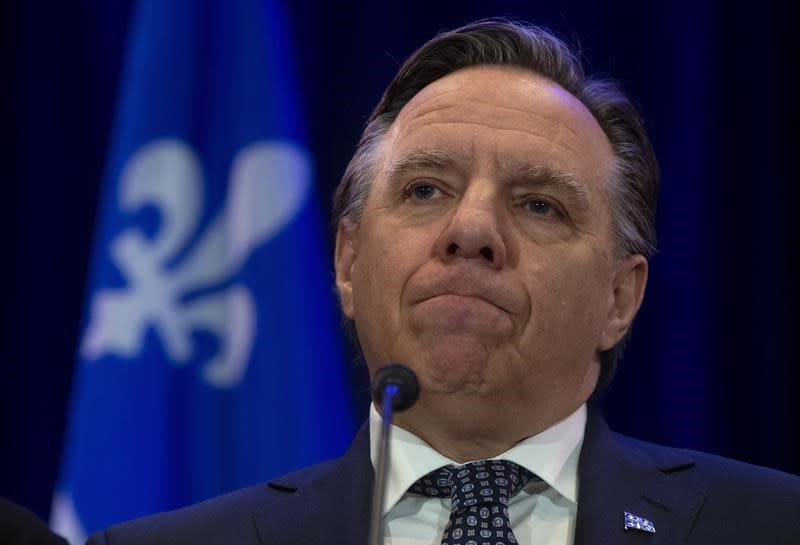Here's what you need to know about SNC-Lavalin, the company at the heart of the PMO scandal

After Jody Wilson-Raybould’s explosive testimony before the House of Commons justice committee, it doesn’t look like the SNC-Lavalin scandal plaguing the Prime Minister’s Office (PMO) will be going away anytime soon.
As the scandal evolves every day, more questions are being raised about the conduct of the PMO and what happens next in the saga involving SNC-Lavalin.
So what is the company at the heart of this scandal? SNC-Lavalin has a checkered past, but its critical role in the Canadian economy makes Ottawa’s alleged extraordinary measures to protect it from prosecution plausible.
WHAT IS SNC-LAVALIN?
SNC-Lavalin is one of the world’s largest engineering firms, responsible for major infrastructure and construction projects globally. Founded in 1911, the company has offices in 50 countries, with its headquarters based in Montreal. It began as engineering firm SNC which expanded into oil and gas, mining and metallurgy and infrastructure projects. In 1991, it merged with engineering giant Lavalin, creating SNC-Lavalin, Canada’s largest engineering and construction company at the time.
The company has been responsible for many major Canadian infrastructure projects, including the James Bay Hydroelectric Development in northern Quebec, the Diavik Diamond Mine in the Northwest Territories, and the Canada Line in British Colombia that runs from Vancouver to Richmond.
WHY IS THE COMPANY SO IMPORTANT?
SNC-Lavalin employs more than 50,000 people around the world, including nearly 9,000 jobs in Canada. It’s among the top 100 companies listed on the Toronto Stock Exchange by market capitalization, and a major global company that is a driver of jobs and economic growth, particularly in Quebec – notably, a province that can decide the winner or loser of a federal election.
The company is undoubtedly important in Quebec. When Quebec Premier François Legault’s government drew up a list of 10 “strategically important” companies that the province would work to prevent from being acquired, one of them was SNC-Lavalin. Corporate head-office flight is a sensitive issue in Quebec after foreign buyers acquired locally-based companies such as aluminum maker Alcan Inc. and home improvement retailer Rona Inc. in recent years.

WHAT HAPPENED TO START THIS CONTROVERSY?
In 2015, the RCMP brought corruption and fraud charges against SNC-Lavalin over allegations that it bribed government officials in Libya to land lucrative contracts. Police alleged that between 2001 and 2011 SNC-Lavalin paid $47.7 million to public officials in Libya to influence government decisions. SNC-Lavalin says the charges are without merit and stem from “alleged reprehensible deeds by former employees who left the company long ago.”
WAIT, LIBYA?
Yes, the same country that was run by brutal former dictator Muammar Gaddafi. In fact, a report from La Presse this week showed that SNC-Lavalin and security firm Garda World were involved in outlandish spending to spoil the son of the Libyan dictator, Saadi Gaddafi, during a 2008 visit to Canada. According to a preliminary inquiry into bribery charges against a former SNC-Lavalin executive, the cost of the trip reached $1.95 million, and included a range of expenses including box seat rentals for a Raptors Game and Spice Girls concert, and escort services.

WHAT DO THESE CHARGES MEAN FOR SNC-LAVALIN?
A conviction for these charges would be absolutely devastating for the company, as it would prevent SNC-Lavalin from bidding on Canadian government business for a decade.
SO WHAT DID SNC-LAVALIN WANT FROM THE GOVERNMENT?
SNC-Lavalin has been lobbying the government to convince Ottawa to introduce remediation agreements into law. Common in the United States (where they are known as “deferred prosecution agreements” or DPAs), remediation agreements are plea bargain-like deals that hold organizations accountable while avoiding the consequences that come with a criminal conviction.
The Liberal government held public consultations about remediation agreements in the fall of 2017. Months later, an amendment bringing remediation agreements into law was quietly included in the government’s omnibus budget legislation. SNC-Lavalin was hoping to be the first company to receive such a remediation agreement.
DID SNC-LAVALIN GET THAT REMEDIATION AGREEMENT?
No, but it wasn’t for a lack of effort on the government’s part, according to former Attorney General Wilson-Raybould. As reported by the Globe and Mail in early February, Prime Minister Justin Trudeau’s office attempted to press the former attorney general to overturn the decision to not negotiate a remediation agreement.
This week, Wilson-Raybould outlined the specific ways she felt pressured by the PMO to reverse the decision. She said there were at least 10 phone calls and 10 different meetings, not to mention several text messages, about the SNC-Lavalin case between her or senior members of her staff and people in the PMO.
WHAT DID WILSON-RAYBOULD SAY ABOUT SNC-LAVALIN?
During her bombshell testimony, Wilson-Raybould described a meeting she had with Prime Minister Justin Trudeau on Sept. 17. According to the former attorney general, the topics of SNC-Lavalin and remediation agreements were raised by Trudeau immediately, even though the meeting was not about the case.
“The Prime Minister asked me to help out to find a solution here for SNC, citing that if there is no DPA, there would be many jobs lost and that SNC would move from Montreal,” Wilson-Raybould said.
“I told him that I had done my due diligence and had made up my mind on SNC and that I was not going to interfere with the decision of the director.”
Wilson-Raybould said Trudeau continued reiterating his concerns about potential job losses and SNC leaving Quebec. Clerk of the Privy Council Michael Wernick, who was also in attendance, then made the case for why a a remediation agreement was necessary.
“They will likely be moving to London if this happens and there’s an election in Quebec soon,” Wernick said, according to Wilson-Raybould. The prime minister also jumped in, stressing the upcoming election, and that he was an MP in Quebec.
“I was quite taken aback,” Wilson-Raybould said.
“My response, and I vividly remember this as well, was to ask the prime minister a direct question while looking him in the eye. I asked, ‘are you politically interfering with my role, my decision as the attorney general? I would strongly advise against it.'”

WHY WAS THE PRIME MINISTER SO CONCERNED ABOUT SNC-LAVALIN MOVING?
For any company, its headquarters comes with many jobs and typically a boost to the local economy. (Just look at how eagerly cities across North America were lobbying Amazon for its second headquarters.) Moving SNC-Lavalin’s headquarters from Montreal, Que. to London, England could results in job losses in Canada., something the Trudeau government was allegedly not keen on letting happen.
The day after Wilson-Raybould’s explosive testimony, Trudeau reassured Canadians that the government was doing its job in a way that respected its institutions.
“Canadians expect their government to look for ways to protect jobs, to grow the economy, and that’s exactly what we’ve done every step of the way,” Trudeau said.
IS THIS THE FIRST TIME SNC-LAVALIN HAS GOTTEN INTO TROUBLE?
This is certainly not the first time SNC-Lavalin has been embroiled in controversy, or facing charges of bribery and financial fraud.
In 2013, the company was barred by World Bank-financed projects for 10 years because of misconduct in not one but two separate projects, including one in Bangladesh and another in Cambodia. According to the World Bank, SNC-Lavalin’s misconduct involved a conspiracy to pay bribes and misrepresentations when bidding for Bank-financed contracts in violation of procurement guidelines.
With files from Bloomberg News and the Canadian Press.

 Yahoo Finance
Yahoo Finance 
